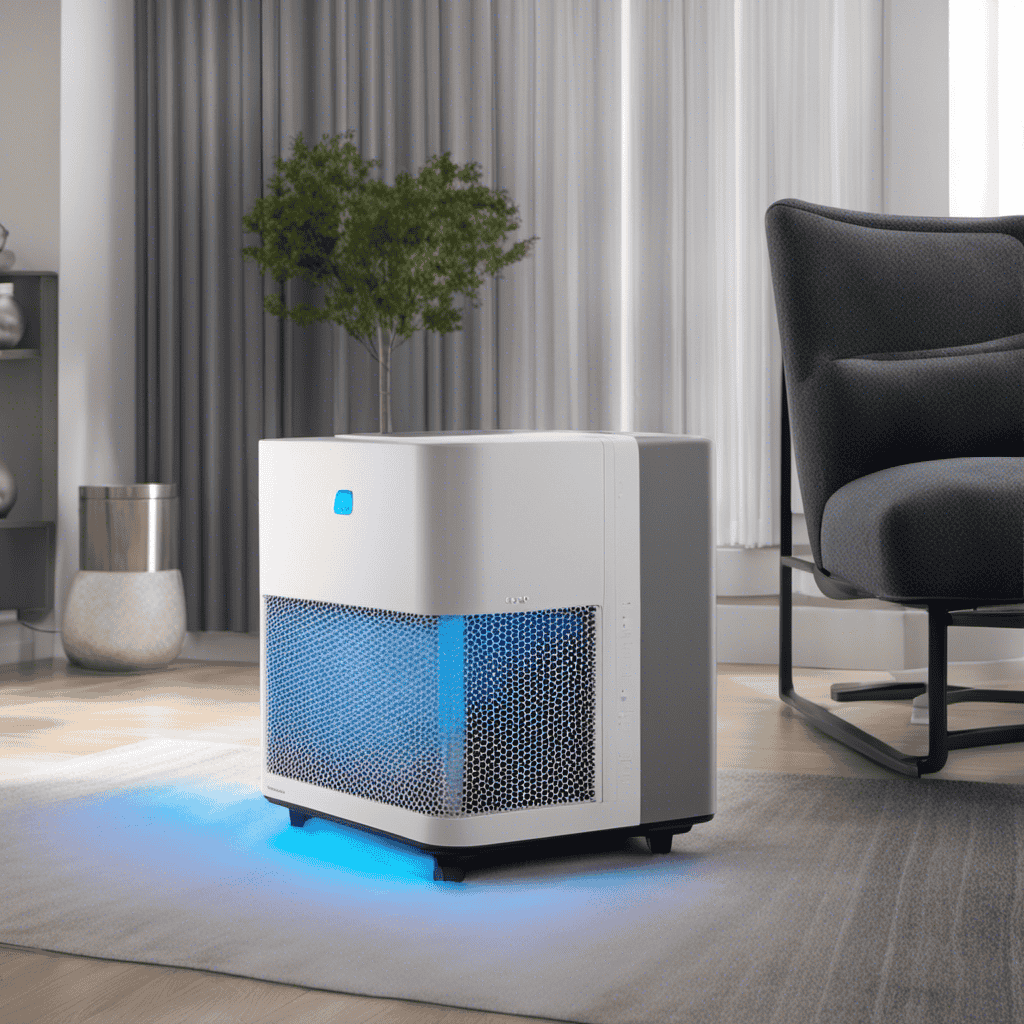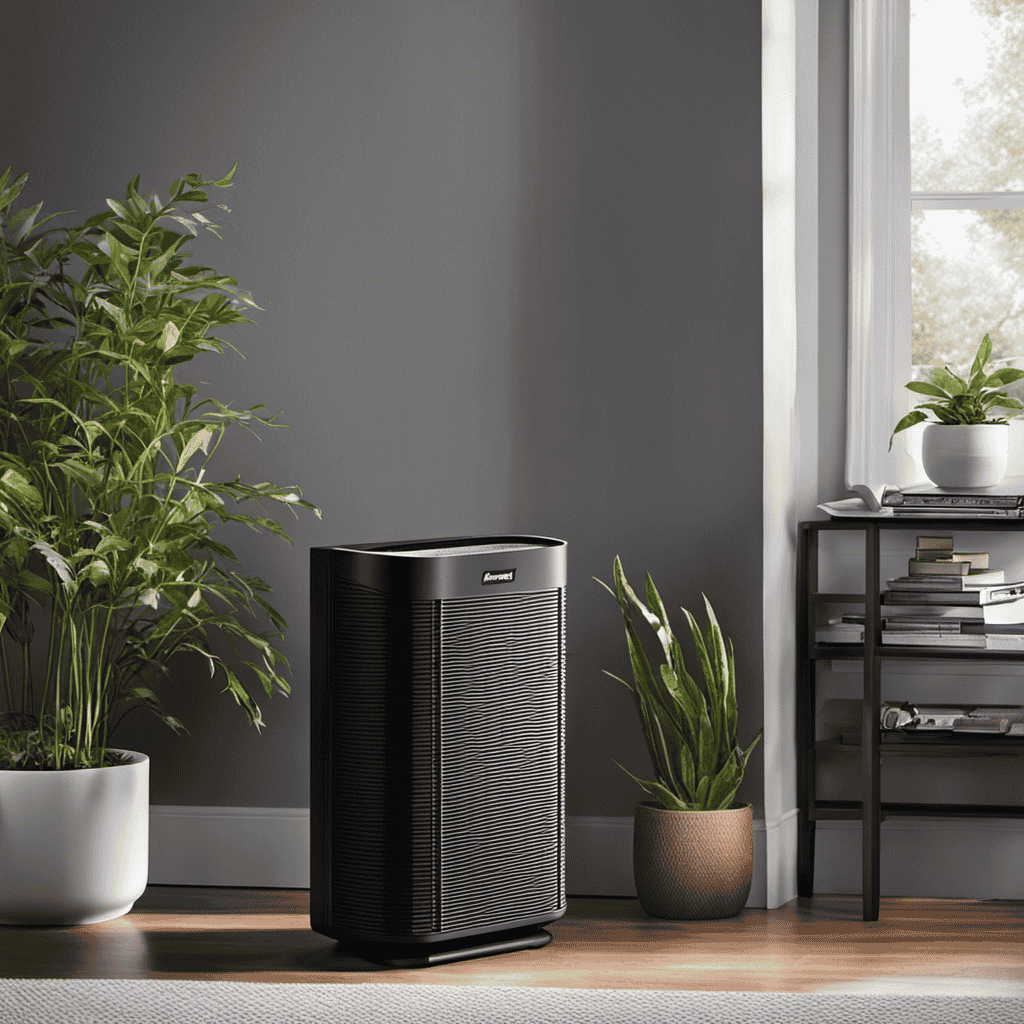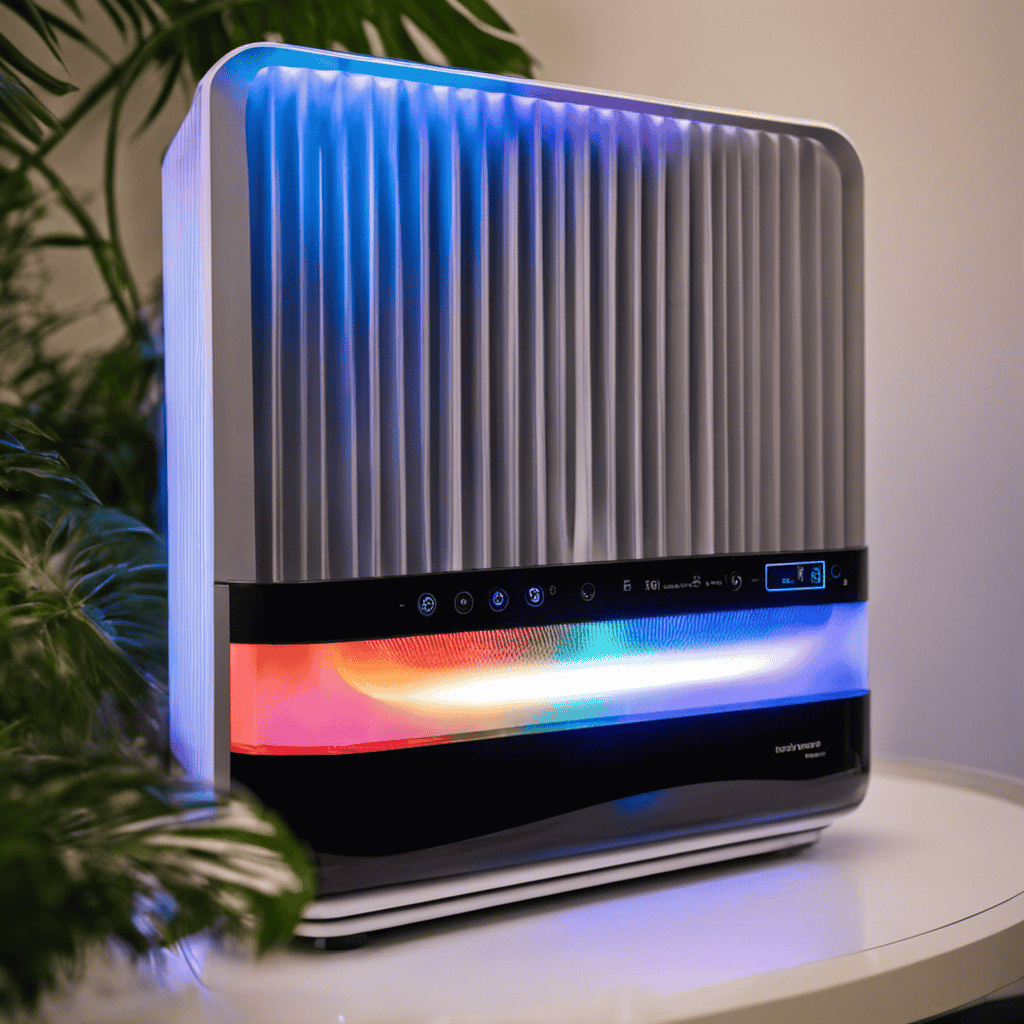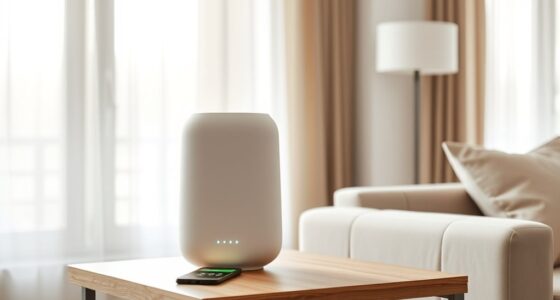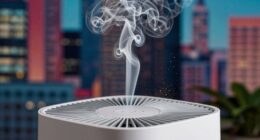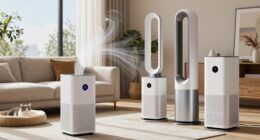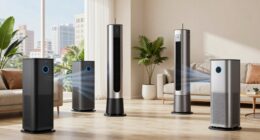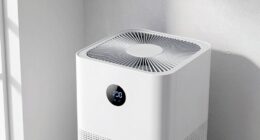Venturing into the field of indoor air quality, I’m faced with a frequent quandary: deciding between the efficiency of a dehumidifier and an air purifier.
This thought-provoking question leads me to explore the benefits, advantages, and key differences between these two devices.
By delving into the realm of effectiveness, energy efficiency, and the role they play in improving our indoor environment, I aim to guide you in choosing the right solution for your home.
So, let us embark on this journey of discovery together.
Key Takeaways
- Dehumidifiers reduce humidity levels and prevent mold growth, while air purifiers remove airborne contaminants and improve overall indoor air quality.
- Dehumidifiers are beneficial for preventing allergies and respiratory issues caused by mold spores, while air purifiers provide relief for allergy sufferers.
- Factors to consider when choosing between a dehumidifier and an air purifier include the size of the area to be treated, specific allergens or pollutants to target, noise level, maintenance requirements, and cost comparison.
- Both dehumidifiers and air purifiers are essential for maintaining a healthy and comfortable living environment, and incorporating both methods can enhance air quality in the home.
Benefits of a Dehumidifier
One of the benefits of a dehumidifier is that it can help reduce the risk of mold growth in your home. Excessive moisture in the air can create a favorable environment for mold to thrive. By removing excess moisture from the air, a dehumidifier can effectively prevent mold growth.
This is especially important for improving respiratory health, as mold spores can trigger allergies and respiratory issues in sensitive individuals. With a dehumidifier, you can maintain a healthy indoor environment and minimize the potential health risks associated with mold.
However, while a dehumidifier can address moisture-related issues, it may not be as effective in removing other airborne contaminants. In the subsequent section, we will explore the advantages of an air purifier, which can complement the benefits of a dehumidifier by further enhancing indoor air quality.
Advantages of an Air Purifier
Consider an air purifier as it can effectively remove allergens, pollutants, and odors from your indoor air. Here are some advantages of using an air purifier with HEPA filters:
-
HEPA filters can capture particles as small as 0.3 microns, including pollen, pet dander, and dust mites.
-
Air purifiers can help alleviate symptoms of asthma and allergies by reducing the presence of airborne irritants.
-
They can remove harmful volatile organic compounds (VOCs) emitted by household products and chemicals.
-
Air purifiers can eliminate unpleasant odors, such as smoke, cooking smells, and pet odors.
-
They can help create a healthier and cleaner indoor environment, especially for those with respiratory conditions.
By using an air purifier, you can improve the air quality in your home and enjoy the benefits of cleaner and fresher air.
Now, let’s explore the key differences between dehumidifiers and air purifiers.
Key Differences Between Dehumidifiers and Air Purifiers
Using an air purifier can significantly improve indoor air quality, but how does it differ from a dehumidifier? While both devices are designed to enhance the air we breathe, they target different issues. An air purifier focuses on removing airborne contaminants such as allergens, dust, and pet dander. On the other hand, a dehumidifier aims to reduce excess moisture in the air, which can lead to mold growth and musty odors. To better understand the differences, let’s compare the benefits of dehumidifiers and the effectiveness of air purifiers in a table:
| Dehumidifier | Air Purifier |
|---|---|
| Reduces humidity levels | Removes airborne contaminants |
| Helps prevent mold and mildew | Filters out allergens and pollutants |
| Reduces musty odors | Improves overall indoor air quality |
| Can be beneficial for people with respiratory issues | Provides relief for allergy sufferers |
Factors to Consider When Choosing Between a Dehumidifier and an Air Purifier
When deciding between a dehumidifier and an air purifier, it’s important to evaluate your specific needs and the issues you want to address. Factors to consider include the size of the area you want to treat, the specific allergens or pollutants you want to remove, and your budget.
Here are some important points to keep in mind:
-
Size: Consider the square footage of the space you want to treat, as dehumidifiers and air purifiers have different coverage capacities.
-
Allergens/Pollutants: Identify the specific allergens or pollutants you want to target, such as dust mites, mold spores, pet dander, or VOCs.
-
Noise Level: Think about where you plan to place the device and if noise level is a concern for you.
-
Maintenance: Consider the maintenance requirements of each device, such as filter changes, cleaning, or emptying water tanks.
-
Cost: Compare the initial cost, ongoing expenses, and energy consumption of both options.
How a Dehumidifier Can Improve Indoor Air Quality
To improve your indoor air quality, a dehumidifier can help reduce excess moisture in the air. Moisture control is crucial in maintaining a healthy living environment, as high humidity levels can lead to the growth of mold, mildew, and dust mites. These allergens can trigger respiratory issues and allergies in individuals.
By using a dehumidifier, you can effectively lower the indoor humidity levels, creating a drier atmosphere that inhibits the growth of these harmful substances. Additionally, a dehumidifier can also help prevent structural damage to your home caused by excessive moisture, such as peeling wallpaper or warped wood.
It is important to monitor and maintain optimal indoor humidity levels, typically between 30% to 50%, to ensure a comfortable and healthy living space.
The Role of an Air Purifier in Removing Airborne Contaminants
When it comes to improving indoor air quality, one key aspect is the removal of airborne pollutants.
An air purifier plays a crucial role in this process by effectively capturing and eliminating harmful contaminants from the air.
Airborne Pollutant Removal
The air purifier effectively removes airborne pollutants, ensuring clean and fresh air in your home. It plays a crucial role in maintaining indoor air quality, especially when it comes to combating allergens and other harmful particles. Here are some key points to consider regarding airborne pollutant removal:
-
Reduces allergens: An air purifier can significantly reduce common allergens like pollen, dust mites, and pet dander, providing relief for allergy sufferers.
-
Removes bacteria and viruses: It captures and eliminates airborne bacteria and viruses, reducing the risk of respiratory infections.
-
Eliminates odors: The purifier helps eliminate unpleasant odors caused by cooking, pets, or other sources.
-
Filters out harmful gases: Some air purifiers are equipped with activated carbon filters that can effectively remove harmful gases like formaldehyde and volatile organic compounds (VOCs).
-
Improves overall air quality: Regular use of an air purifier can help maintain a healthier indoor environment, especially when combined with proper indoor humidity control and regular air quality testing.
Health Benefits of Purification
Investing in an air purifier can greatly improve your health by reducing allergens, eliminating bacteria and viruses, and filtering out harmful gases. Indoor air quality plays a significant role in our overall well-being, especially when it comes to respiratory health. By removing airborne pollutants, an air purifier can help alleviate symptoms of allergies, asthma, and other respiratory conditions. Additionally, a well-maintained indoor environment with optimal humidity levels can prevent the growth of mold and mildew, which can also trigger respiratory problems. To understand the benefits of air purification and indoor humidity control, consider the following table:
| Health Benefits of Air Purification and Humidity Control |
|---|
| Reduces allergens and irritants |
| Eliminates bacteria and viruses |
| Filters out harmful gases |
| Prevents mold and mildew growth |
In the next section, we will delve into the question of whether a dehumidifier or an air purifier is more effective in reducing allergens, providing a comprehensive analysis of each option.
Which Is More Effective in Reducing Allergens: Dehumidifier or Air Purifier
An air purifier is more effective in reducing allergens compared to a dehumidifier. When considering the effectiveness comparison between the two, it is important to take into account the following factors:
-
Filtration technology: Air purifiers use advanced filtration systems, such as HEPA filters, to trap and eliminate microscopic allergens, including dust mites, pollen, and pet dander.
-
Coverage area: Air purifiers are designed to clean the air in a specific room or area, ensuring that the air you breathe is free from allergens.
-
Cost comparison: While air purifiers may have a higher initial cost, they require less maintenance and filter replacements compared to dehumidifiers, making them more cost-effective in the long run.
-
Allergen removal: Air purifiers are specifically designed to remove allergens from the air, while dehumidifiers primarily focus on reducing humidity levels.
-
Allergen prevention: Air purifiers can help prevent the spread of allergens by capturing them before they have a chance to settle on surfaces, reducing the risk of allergic reactions.
Energy Efficiency: Dehumidifiers Vs Air Purifiers
In terms of energy consumption, both dehumidifiers and air purifiers have their own advantages and disadvantages.
Dehumidifiers typically require more energy to operate because they need to remove moisture from the air, which requires the use of a compressor. On the other hand, air purifiers typically have lower energy consumption because they don’t require any additional processes like dehumidification.
When it comes to noise levels, dehumidifiers tend to be noisier compared to air purifiers.
This is because dehumidifiers use a compressor and a fan to extract moisture from the air, which can generate more noise. Air purifiers, on the other hand, usually have quieter operation, especially if they are equipped with advanced noise reduction technology.
Considering both energy consumption and noise levels, it is important to choose a device that suits your specific needs and preferences.
If energy efficiency and low noise levels are important to you, then an air purifier may be the better option. However, if reducing humidity levels is your main concern, then a dehumidifier might be more suitable.
Choosing the Right Solution for Your Home: Dehumidifier or Air Purifier
When it comes to creating a comfortable and healthy living environment, there are a few key factors to consider. One of these factors is moisture control options. Dehumidifiers, for example, help to reduce excess humidity which can lead to mold and mildew growth.
Another factor to consider is air quality improvement. Air purifiers focus on removing pollutants and allergens from the air, improving overall air quality.
Ultimately, the choice between a dehumidifier and an air purifier depends on the specific needs of your home and the issues you are trying to address.
Moisture Control Options
To combat excess moisture in your home, you should consider using a dehumidifier or an air purifier. Both options can help with indoor humidity management and mold prevention. Here are five reasons why these devices are essential for maintaining a healthy and comfortable living environment:
- Dehumidifiers remove excess moisture from the air, reducing humidity levels and preventing mold growth.
- Air purifiers filter out airborne contaminants such as dust, pollen, and pet dander, improving indoor air quality.
- Dehumidifiers help alleviate respiratory issues caused by high humidity, such as allergies and asthma.
- Air purifiers eliminate odors, leaving your home smelling fresh and clean.
- Both devices are energy-efficient and can help lower your energy bills.
Whether you choose a dehumidifier or an air purifier, investing in one of these devices is crucial for maintaining a moisture-free and healthy home environment.
Air Quality Improvement
Now that we have discussed moisture control options, let’s move on to the next aspect of improving air quality.
One crucial step in maintaining a healthy environment is monitoring the air quality in our homes. Regular air quality monitoring helps us identify any potential issues and take appropriate measures to address them.
When it comes to purifying the air, there are various methods available. While dehumidifiers primarily focus on reducing moisture levels, air purifiers are specifically designed to remove pollutants such as dust, pet dander, pollen, and odors from the air.
However, in addition to using mechanical devices, there are also natural methods that can help purify the air. These include placing indoor plants, which act as natural air purifiers, and using essential oils known for their air purification properties.
Incorporating such natural methods alongside mechanical devices can enhance the air quality in our homes and create a healthier living environment.
Specific Home Needs
If you want to address your specific home needs, consider factors like the size of your space and any unique air quality concerns you may have.
When it comes to improving air quality, there are two main options to consider: dehumidifiers and air purifiers.
To determine which one is better for your specific requirements, it’s important to compare their features and benefits. Here are some key points to consider:
-
Size of your space: If you have a small area, a compact air purifier might be sufficient. However, for larger spaces, a dehumidifier with a higher capacity might be more effective.
-
Air quality concerns: If you have specific concerns like allergies or asthma, an air purifier with HEPA filters can help remove allergens and pollutants from the air. On the other hand, if you live in a humid climate or have issues with moisture, a dehumidifier can help reduce excess humidity and prevent mold and mildew growth.
Frequently Asked Questions
Can a Dehumidifier Remove Airborne Contaminants Like an Air Purifier?
Yes, a dehumidifier can remove some airborne contaminants like mold spores and dust mites. However, an air purifier is more effective at removing a wider range of airborne pollutants, including allergens, smoke, and pet dander, providing additional benefits for indoor air quality.
How Does a Dehumidifier Affect Humidity Levels in a Room?
When it comes to humidity levels in a room, a dehumidifier can be highly efficient. It helps to reduce moisture, which in turn can have a positive impact on respiratory health.
Do Air Purifiers Also Remove Odors, or Is That a Function Only Performed by Dehumidifiers?
Air purifiers can help with allergies by removing allergens from the air, while dehumidifiers primarily reduce moisture levels. Both have their benefits, but the effectiveness and cost depend on individual needs and preferences.
Are There Any Health Risks Associated With Using a Dehumidifier or Air Purifier for Extended Periods of Time?
Extended use of a dehumidifier or air purifier may pose health risks due to possible ozone emissions or dry air effects. However, both appliances offer significant health benefits when used properly and can be energy-efficient.
Can a Combination of a Dehumidifier and an Air Purifier Provide the Most Effective Indoor Air Quality Improvement?
A combination of a dehumidifier and an air purifier can provide the most effective indoor air quality improvement. By reducing humidity levels and removing airborne pollutants, it creates a healthier and more comfortable living environment.
Can an Air Purifier Also Help with Humidity Control Like a Dehumidifier?
Yes, an air purifier can help with humidity control to some extent, but it is not as effective as a dehumidifier for lowering the moisture level in the air. While an air purifier can remove some excess moisture, a dehumidifier is specifically designed to regulate humidity levels. When comparing air purifier vs dehumidifier, the latter is the better choice for controlling humidity.
Conclusion
After analyzing the benefits and advantages of both dehumidifiers and air purifiers, it is clear that choosing between the two is like deciding between a refreshing breeze and a breath of fresh air.
While dehumidifiers effectively reduce moisture levels, air purifiers excel at removing airborne contaminants.
Each has its own unique role in improving indoor air quality.
So, whether you want to combat allergies or create a more comfortable environment, carefully consider your needs to select the right solution for your home.

